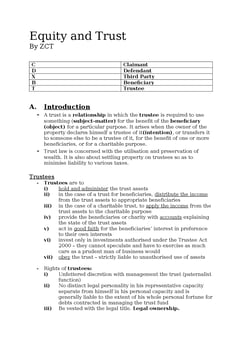Dingle v Turner And Others [1972] AC 601; [1972] 2 WLR 523; [1972] 1 All ER 878
Judgement for the case Dingle v Turner And Others
Table Of Contents
KEY POINTS
Charity has long been recognized as a fundamental aspect of human compassion and social responsibility. It embodies the altruistic act of providing assistance and support to those in need, reflecting a collective commitment to building a more compassionate and equitable society.
Gifts designated for limited recipients are tangible expressions of generosity and care.
The relief of poverty remains a goal in humanitarian efforts worldwide. As a social imperative, poverty relief initiatives aim to alleviate marginalized populations' hardships, addressing the symptoms and root causes of economic inequality.
Company involvement in social causes is increasingly recognized as a powerful force for positive change. Beyond profit-driven motives, companies engaging in philanthropy and corporate social responsibility foster a sense of purpose, contributing to improving communities and the environment.
Trusts established to pay pensions to "poor employees" represent a structured approach to addressing financial insecurity in vulnerable populations.
FACTS
-
In 1950, Frank Hanscomb Dingle ("Testator") specified in his will that the trustees were to allocate the income from his residuary estate to his wife during her lifetime.
Following her demise, the Testator directed the Trustees to invest £10,000 in the names of the Trustees, establishing a trust to apply the income to provide pensions for the impoverished employees of E Ltd., a company jointly owned by the Testator.
The Testator further mandated that the ultimate residue of his estate be held by the trustees on a similar trust. The Testator passed away in 1950, and his widow followed in 1966.
-
At the time of the Testator's demise, E Ltd. employed over 600 individuals, including many former employees.
In 2024, the first respondent, an executor and trustee of the will, filed a summons to clarify the trust's validity.
As of the summons date, E Ltd. had 706 full-time and 189 part-time employees, with pensions being disbursed to 89 ex-employees.
Upon examination, Megarry J. ruled that the trust constituted a valid charitable trust.
Subsequently, an appeal was lodged by Mrs. Betty Mary Dingle ("Appellant"), an interested party in the case, who was also a Defendant to the summons.
JUDGEMENT
The appeal was dismissed, affirming the earlier decision by Megarry J.
-
The court held that a trust for "poor employees" is indeed capable of constituting a valid charitable trust.
The distinction in the field of poverty relief trusts lies in whether the gift is intended for a specific group's poverty relief or is a provision for particular individuals.
The court found that the trust in question was a valid charitable trust, aligning with the criteria for addressing a broader societal concern.
Megarry J.'s decision has been upheld, solidifying the trust's status as a valid charitable instrument.
COMMENTARY
This case highlights the enduring importance of charity as a cornerstone of human compassion and social responsibility. It shows the diverse expressions of generosity, from targeted gifts to broader initiatives addressing poverty worldwide.
Corporate involvement in social causes is recognized as a catalyst for positive change, contributing to community and environmental well-being.
The case of Frank Hanscomb Dingle's will, dated 1950, outlines a structured approach to addressing financial insecurity through trusts for "poor employees" of jointly owned company E Ltd.
In 2024, a legal challenge questioned the trust's validity, leading to Megarry J.'s affirmation of its status as a valid charitable trust.
The subsequent dismissal of the appeal upholds the court's decision, emphasizing the trust's alignment with broader societal concerns and thereby solidifying its charitable instrument status.
For Further Study on Dingle v Turner And Others
Need instant answers? Our AI exam tutor is here to help.
Ask questions 🙋 Get answers 📔 It's simple 👁️👄👁️
Our AI is educated by the highest scoring students across all subjects and schools. Join hundreds of your peers today.
Get StartedSimilar Cases
Related Product Samples
These product samples contain the same concepts we cover in this case.
| Trusts and Equity | Charitable Purpose Trusts Notes (17 pages) |
| Trusts and Equity | Charitable Trusts Notes (17 pages) |

